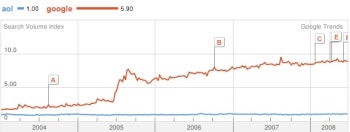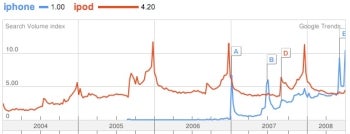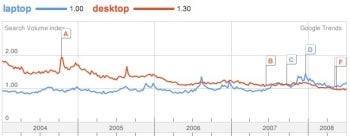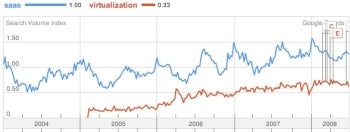Google Trends, a kind of a search engine within a search engine, reveals the popularity – or unpopularity – of a given search keyword. Its results reflect mega-patterns of what people are thinking about (if you accept the thesis that Internet searches equal the public’s level of interest).
The data goes back to 2004, so Google Trends often shows a multi-year trend of ascendance. Or, poignantly, a multi-year sinking trend line that suggests a given person or thing is yesterday’s lunch meat.
This tool is good way to get a forward-looking glimpse of what tech trends are coming or going. Take, for example, the Google Trends data for Bill Gates. Mr. Gates generates a whole lot of searches – almost as many as Tom Cruise. But you’ll notice that, apart from a few spikes (his CES keynote, or when he lost “richest man in the world” status) his trend line is beginning to fade. (For that matter, Tom Cruise is also pretty flat, even a tad lower, which makes sense; both Cruise and Gates are icons whose glory days are behind them.)
As an extreme example of two contrasting tech trends, look at the graph that compares searches for AOL and Google:
 |
You’ll note that Google is attracting almost six times as many searches as AOL. No surprise there. In fact, looking at the trend line, you might wonder: is AOL still in business? (Yes it is, but is there anyone still using an AOL email address?)
Here are two trend lines that are better matched:

Wow, look at those spikes for the iPod back in 2005-06. At the time, you were a nobody without an iPod, remember? These days you can see similar spikes driving iPhone mania, and even – gasp – overtaking the cultural buzz surrounding the once zeitgeist-defining iPod.

To illustrate the growth of the laptop, I used the search terms ‘buy laptop’ and ‘buy PC’. (The term ‘buy desktop’ get comparatively few searches; it’s likely that most shoppers search for ‘PC’, not ‘desktop’.) Based on shopper interest online, it looks like the desktop is on its way to relic status. Some day, it seems, very few people will want a stationary computer.
(By the way, the top result for the term “desktop” is the page for ‘Google Desktop download’. Is Google favoring itself? Could Google’s desktop product really be the absolute most compelling result for the zillions of people who search for ‘desktop’? It must be nice to run your own search engine, huh?)

Both SaaS (software as a service), meaning to access software over the Net instead of installing it on your hard drive, and virtualization, a method of divvying up a hard drive to install different OSes, are on the rise.
SaaS is likely ahead because it’s popular among both consumers and businesses, while virtualization is largely for business users, though some serious geeks use it on their personal machines.

